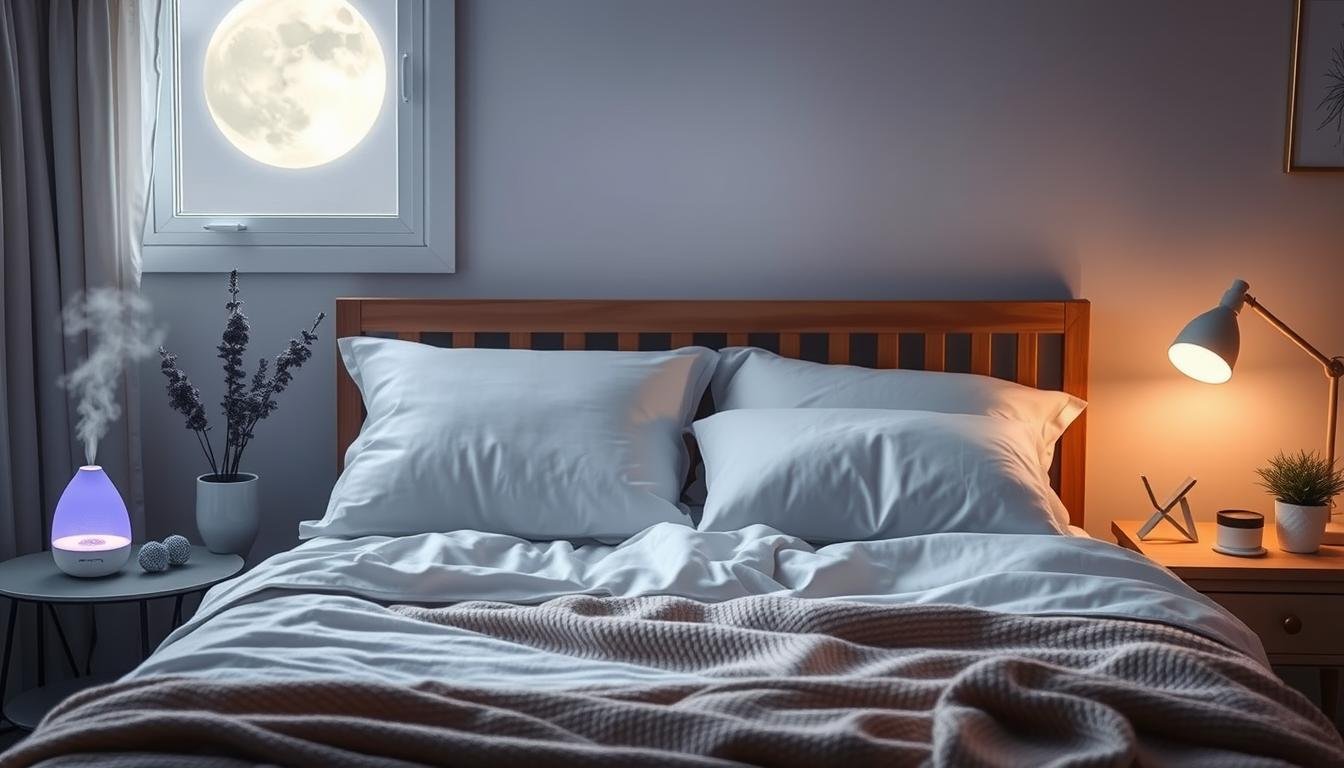Getting quality sleep is key for your health and happiness. In this guide, we’ll share expert tips to help you sleep better and feel amazing. We’ll talk about setting a regular sleep schedule, making your sleep space cozy, and using relaxation techniques. These strategies will improve your sleep and boost your energy.
Good sleep is important for your body and mind. It helps you feel refreshed, focused, and emotionally balanced. By improving your sleep habits, you can enjoy better concentration, more productivity, and a happier mood.
If you’re having trouble sleeping, this article is for you. It offers solutions to help you overcome sleep problems and get the rest you need. Start your journey to better sleep and a healthier, happier you today.
Understanding the Importance of Quality Sleep
Quality sleep is key for our physical and mental health. Our bodies repair and strengthen during sleep. This helps our immune system and brain work better. [https://qqasean99.com/]
But, not getting enough sleep can harm us. It can make us more likely to get sick and affect our mood and thinking skills.
Sleep's Impact on Physical and Mental Health
Sleep is vital for our health. It helps our bodies fix tissues and keep hormones in balance. This boosts our immune system and keeps us healthy.
It also helps our brains work well. Sleep is important for memory and handling emotions. This lets us stay focused and feel good during the day.
The Consequences of Sleep Deprivation
- Increased risk of chronic conditions like heart disease, diabetes, and obesity
- Compromised immune system and higher susceptibility to illness
- Impaired cognitive abilities, including difficulty with focus, decision-making, and problem-solving
- Mood disturbances, such as irritability, anxiety, and depression
- Decreased productivity and performance in daily activities
| Aspect | Sleep’s Impact | Consequences of Sleep Deprivation |
|---|---|---|
| Physical Health | Supports immune system, tissue repair, hormone regulation | Increased risk of chronic conditions, compromised immune system |
| Mental Health | Enhances cognitive function, memory, emotional regulation | Impaired cognitive abilities, mood disturbances |
| Overall Well-being | Promotes optimal physical and mental functioning | Decreased productivity and performance in daily activities |
Knowing how sleep affects us helps us make better choices. We can improve our sleep to live a healthier life. [https://qqasean99.com/]
Establishing a Consistent Sleep Schedule
Creating a consistent sleep schedule is key to better sleep. Going to bed and waking up at the same time every day helps your body’s internal clock work well. A calming bedtime routine also tells your body it’s time to sleep.
Here are some tips to help you establish a consistent sleep schedule:
- Set a fixed bedtime and stick to it, even on weekends. This helps your body get used to a regular sleep-wake cycle.
- Develop a relaxing bedtime routine, such as taking a warm bath, reading a book, or practicing light stretching. This cues your body that it’s time to sleep.
- Avoid long naps during the day, as they can disrupt your overall sleep patterns.
- Limit exposure to blue light from electronic devices, such as phones and computers, before bedtime, as it can suppress melatonin production and make it harder to fall asleep.
- Create a sleep-friendly environment in your bedroom by keeping it dark, cool, and quiet.
By establishing a consistent sleep schedule and implementing a calming bedtime routine, you can help your body regulate its sleep-wake cycle. This leads to better quality sleep and improved overall health and well-being.
Creating a Sleep-Friendly Environment
Making your bedroom a sleep haven is key for quality rest. By tweaking your bedroom’s setup, you can make it a calm, distraction-free zone. This helps prepare you for a better night’s sleep.
Optimizing Bedroom Conditions
Your bedroom should be cool, dark, and quiet for sleep. Keep the temperature between 65-70°F (18-21°C) for better sleep. Use blackout curtains or an eye mask to block out light.
Light can mess with your sleep cycle. For a quiet space, try a white noise machine or earplugs. They help block out distractions.
Minimizing Distractions and Noise
- Don’t use electronic devices like phones or computers in bed. The blue light they give off can mess with your sleep.
- Keep your bedroom tidy and only use it for sleep and relaxation. Avoid work or activities that keep your mind active.
- If outside noise bothers you, use soundproofing like heavy curtains or rugs. They help block out unwanted sounds.
By making your bedroom comfortable, dark, and quiet, you’re setting up for a restful night. This environment is key for a good night’s sleep.
Relaxation Techniques for Better Sleep
Getting quality sleep is key for your health and happiness. Adding relaxation techniques to your bedtime routine can help a lot. These methods calm your mind and body, making it easier to fall and stay asleep.
Mindfulness and Meditation Practices
Mindfulness and meditation are great for relaxation and sleep. They help you focus on the now, breathe deeply, and find inner peace. Doing these before bed can lower stress and anxiety, helping you relax better.
- Guided meditation: Listen to soothing audio recordings that lead you through a relaxing meditation session.
- Breath work: Engage in deep, slow breathing exercises to calm the mind and body.
- Body scans: Mentally scan your body, noticing areas of tension and consciously relaxing each muscle group.
Adding these relaxation techniques to your bedtime can really improve your sleep. By focusing on relaxation and mindfulness, you make your sleep space better. This leads to better rest and overall health.
Dietary Habits and Sleep Quality
The foods and drinks you choose can greatly affect your sleep. Nutrients like tryptophan, melatonin, and magnesium help you relax and sleep better. On the other hand, caffeine and alcohol can mess with your sleep. Being careful with what you eat can help your body sleep better.
Foods that Promote Restful Sleep
To sleep better, add these foods to your diet:
- Tart cherries are full of melatonin, helping control your sleep cycle.
- Fatty fish like salmon, mackerel, and tuna boost vitamin D and omega-3s for better sleep.
- Whole grains, like oats and brown rice, have complex carbs that raise serotonin and calm you down.
- Nuts and seeds, such as almonds, walnuts, and flaxseeds, are packed with magnesium for sleep.
Avoiding Sleep-Disruptive Substances
Some foods can hurt your sleep. Be careful with:
- Caffeine in coffee, tea, energy drinks, and some sodas can make it hard to fall and stay asleep.
- Alcohol might help you fall asleep but can break up your sleep and lower its quality later.
- Spicy or heavy meals can upset your stomach and disturb your sleep.
Choosing the right foods and avoiding bad ones can greatly improve your sleep. This can also boost your overall health.
Exercise and Its Impact on Sleep
Regular exercise greatly improves sleep quality. It reduces stress, boosts mood, and helps regulate the body’s clock. But, it’s important to exercise at the right time. Working out too close to bedtime can actually make it harder to sleep.
To get the most sleep benefits from exercise, follow these tips:
- Try to do at least 30 minutes of moderate exercise, like brisk walking or cycling, most days.
- Stay away from intense workouts before bed. They can keep you awake and make it hard to relax.
- Include a variety of exercises, like cardio, strength training, and stretching, to keep your body and mind healthy.
- Pay attention to how your body feels and adjust your workout schedule as needed for better sleep.
By making exercise a regular part of your life and timing it right, you can improve your sleep. Start with small steps and gradually increase your activity. Soon, you’ll enjoy the benefits of a good night’s rest.
Managing Stress for Improved Sleep
Stress often disrupts our sleep. It can cause our minds to race, our muscles to tense, and our bodies to feel alert. By tackling the stressors in our lives, we can make our sleep environment better.
Relaxation practices are key to managing stress for better sleep. Deep breathing, progressive muscle relaxation, and mindfulness meditation calm the mind and body. They prepare us for a peaceful night’s rest.
It’s also crucial to tackle specific stressors that affect our sleep. This might mean setting limits, sharing tasks, or getting support from friends or professionals. By managing these stressors, we can improve our sleep quality.
Regular exercise is another great way to manage stress and sleep better. Exercise releases tension, boosts mood, and enhances overall well-being. Just remember to avoid intense workouts before bed, as they can interfere with sleep.
By focusing on stress management and using these strategies, we can improve our sleep quality. This is essential for our body and mind to thrive.
| Stress Management Technique | Benefits for Sleep |
|---|---|
| Relaxation Practices (e.g., deep breathing, meditation) | Calms the mind and body, reduces physiological arousal |
| Addressing Sleep-Disruptive Stressors | Reduces the impact of stress on sleep quality |
| Regular Exercise | Helps dissipate built-up tension, boosts mood, and promotes overall well-being |
Supplements and Natural Remedies for Sleep
Some supplements and natural remedies can help improve sleep quality. Melatonin, a hormone our bodies make, is key in regulating sleep. Taking melatonin supplements can support healthy sleep patterns.
Melatonin and Its Benefits for Sleep
Melatonin signals to our bodies when it’s time to sleep or wake up. It’s great for those who find it hard to fall asleep or stay asleep. It’s also good for jet lag or irregular work shifts, helping our body clocks adjust.
Other Natural Sleep Aids
There are other natural sleep aids too. Herbs like valerian root, chamomile, and passionflower help relax and improve sleep. Minerals like magnesium also support sleep by relaxing the body and mind.
| Natural Sleep Remedy | Potential Benefits |
|---|---|
| Melatonin | Regulates the sleep-wake cycle, helpful for jet lag and irregular sleep schedules |
| Valerian Root | Promotes relaxation and may improve sleep quality |
| Chamomile | Has calming properties and may aid in falling asleep faster |
| Magnesium | Helps relax the body and mind, important for healthy sleep patterns |
It’s important to talk to a healthcare professional before trying natural sleep remedies. They can help ensure the safety and effectiveness of any supplements or herbs. With the right approach, these natural solutions can greatly improve sleep and overall health.
Addressing Common Sleep Disorders
Getting a good night’s sleep is key for health and happiness. But, some people face ongoing sleep issues that might signal a sleep disorder. It’s important to know the signs and get help to sleep better and live better.
Recognizing the Signs of Sleep Disorders
Insomnia, sleep apnea, and restless leg syndrome are common sleep disorders. Insomnia makes it hard to fall or stay asleep, causing tiredness and brain fog. Sleep apnea leads to loud snoring and feeling tired during the day because of breathing stops.
Restless leg syndrome is a brain issue that makes you want to move your legs a lot. This can mess up your sleep and make you feel uncomfortable.
Seeking Professional Help
If you think you have a sleep disorder, see a doctor. A sleep specialist or your regular doctor can check you out and find the right treatment. They might suggest changes in your life, medicine, or special therapies.
With the right help, you can take back control of your sleep. This way, you can enjoy the many good things about getting quality rest.
| Common Sleep Disorders | Symptoms | Recommended Treatment |
|---|---|---|
| Insomnia | Difficulty falling asleep or staying asleep, daytime fatigue | Cognitive-behavioral therapy, sleep hygiene techniques, medication (if necessary) |
| Sleep Apnea | Loud snoring, repeated breathing interruptions, daytime drowsiness | CPAP (Continuous Positive Airway Pressure) therapy, oral appliances, lifestyle changes |
| Restless Leg Syndrome | Overwhelming urge to move the legs, discomfort, disrupted sleep | Medications, lifestyle modifications, and relaxation techniques |
Tracking and Monitoring Sleep
Monitoring your sleep can give you valuable insights into your health. It helps you understand your sleep habits and find ways to improve. Sleep tracking goes beyond just counting how long you sleep.
The Power of Sleep Tracking
Sleep tracking offers a lot of data to improve your sleep and health. It shows your sleep stages, how long you sleep, and how well you sleep. This info helps you change your sleep routine and environment for better rest.
Choosing the Right Sleep Tracking Tools
There are many sleep tracking tools available today. You can choose from fitness trackers, apps, or dedicated sleep devices. Look for tools that are accurate, easy to use, and provide detailed data. Comparing different tools can help you find the best one for your sleep needs.
| Sleep Tracking Tool | Key Features | Pros | Cons |
|---|---|---|---|
| Fitbit Versa 3 | – Tracks sleep stages – Monitors sleep duration and quality – Provides sleep score and personalized insights | – Accurate sleep tracking – Integrates with Fitbit app – Offers guided breathing exercises | – Requires wearing a device to bed – Limited battery life |
| Sleep Cycle App | – Analyzes sleep patterns using sound or movement – Wakes you up during light sleep for a gentler start | – No wearable device required – Provides detailed sleep analysis – Includes alarm and soundscapes | – Accuracy may vary depending on device placement – Needs access to microphone or accelerometer |
| Withings Sleep Analyzer | – Tracks sleep stages, duration, and quality – Monitors snoring and heart rate | – Automatic sleep tracking without wearables – Provides comprehensive sleep insights – Integrates with Withings app | – Requires placement under the mattress – Additional cost for the device |
By using sleep tracking, you can improve your sleep and health. Look for the right tool for you and make better sleep choices. This can lead to a healthier and more restful life.
Conclusion
In this article, we’ve covered many tips to help you sleep better and feel better overall. You now know how important good sleep is. You can make your sleep space better, relax more, and handle stress well.
Keeping a regular sleep schedule and making your bedroom comfy are crucial. Also, eating right and exercising can help a lot with sleep. These steps can make a big difference in how well you sleep.
Dealing with sleep problems, using natural remedies, and tracking your sleep can help a lot. Remember, getting better sleep is a journey. But with these tips, you can enjoy a good night’s sleep and feel great all day.





